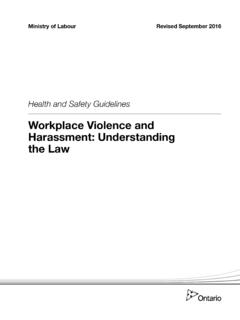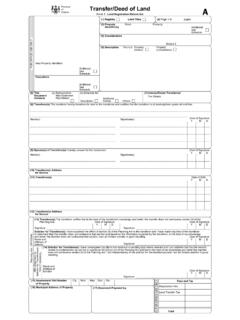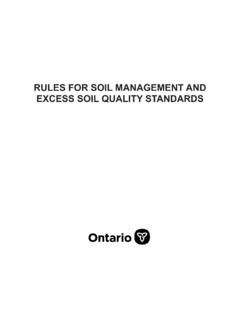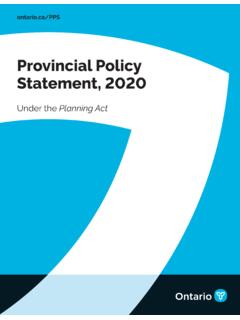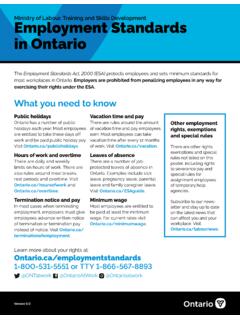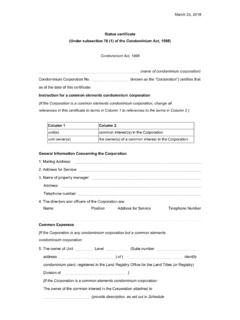Transcription of Information for Employees About Hours of Work and …
1 Ministry of Labour Information for Employees About Hours of Work and Overtime Pay Disclaimer: This resource has been prepared to help Employees and employers understand some of the minimum rights and obligations established under the Employment Standards Act, 2000 (ESA) and regulations. It is not legal advice. It is not intended to replace the ESA or regulations and reference should always be made to the official version of the legislation. Although we endeavor to ensure that the Information in this resource is as current and accurate as possible, errors do occasionally occur. The ESA provides minimum standards only. Some Employees may have greater rights under an employment contract, collective agreement, the common law or other legislation. Employers and Employees may wish to obtain legal advice. These are the general rules in Ontario About Hours of work and overtime pay. There are exceptions and special rules for some Employees under the Employment Standards Act, 2000 (ESA).
2 To see if your occupation or the industry you work in is subject to special rules or exemptions see the Guide to Employment Standards Special Rules and Exemptions available at Your employer cannot intimidate you, fire you, suspend you, reduce your pay, punish you in any other way or threaten any of these actions for exercising your ESA rights. Hours of work The maximum daily and weekly limits on Hours of work are: 8 Hours a day (or the number of Hours in your regular work day, if it is more than 8), 48 Hours a week. Rest periods and eating periods Your employer must give you at least: 11 consecutive Hours off work each day (a day is a 24-hour period it does not have to be a calendar day); 8 Hours off work between shifts (unless total time worked on the shifts is 13 Hours or less, or you and your employer have otherwise agreed in writing, including electronically); andMinistry of Labour 2 24 consecutive Hours off work each work week (or 48 consecutive Hours off every two work weeks).
3 A 30-minute eating period after no more than five Hours of work. You can agree with your employer to split this eating period into two shorter breaks. Overtime payment For every hour you work over 44 Hours a week, your employer must pay you at least 1 times your regular rate of pay ( time and a half ). You can also have a written agreement with your employer to get paid time off for any overtime Hours you work. If you have such an agreement, the employer would have to provide you with one and one-half Hours of paid time off for each hour of overtime that you work. Excess Hours of work and overtime averaging You do not have to but if you choose to, you can agree with your employer to: work more than 8 Hours a day (or the number of Hours in your regular work day, if it is more than 8), work more than 48 Hours a week, and / or average the Hours you work over periods of two, three or four weeks when calculating overtime pay.
4 You cannot work more than the number of Hours shown in your written agreement. Also, your Hours of work cannot be averaged over a period that is greater than four weeks when calculating your overtime pay four weeks is the maximum. You can cancel an agreement to work excess daily or weekly Hours by giving your employer two weeks written notice. Your employer can also cancel an agreement by giving you reasonable notice. Overtime averaging agreements for Employees not represented by a union must have a start date and an expiry date. The agreement can be no longer than two years from the start date and cannot be cancelled unless both you and your employer agree. Generally, if you are represented by a union, your union would make agreements with your employer on your behalf. For more Information or to file a claim If you have questions About the ESA call the Ministry of Labour s Employment Standards Information Centre at 416-326-7160, toll free at 1-800-531-5551, or TTY 1-866-567-8893.
5 Information is available in multiple languages. More Information on Hours of work and overtime pay can be found in Your Guide to the Employment Standards Act, 2000 available at You may also wish to try the Hours of Work and Overtime Tool available at To file a claim, you can access the Employment Standards Claim Form online at v. April/19

